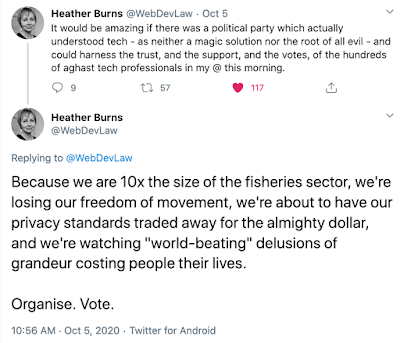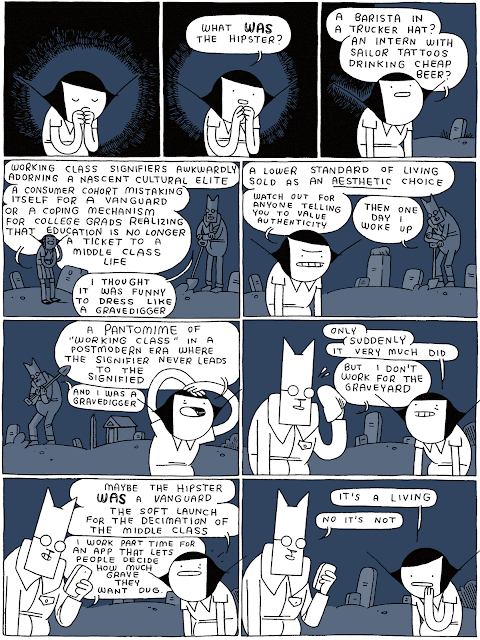Weeknotes: data, consumerism, politics
This reminded me of the end of SomethingNew noted last week:
 | |
| https://twitter.com/WebDevLaw/status/1313055442105495552 | |
Rest of World features phone homescreens (via Matt Locke). Partly for the perspectives of healthcare workers around the world, and partly for their experiences with tech - the things they do to manage the costs (the costs themselves!) or the notifications, or the stuff they feel unable to change, like this:
Why do you have a woman doing yoga as your background?
* With a Huawei phone, there’s an app that regularly updates with their photos. I’ve deleted them a few times, but it keeps sending them.
Holly Gramazio found something weird:

after some debate in the thread, it turns out the proportions are off because google scans different kinds of documents at different times, so a lot of weird papers can distort the patterns.
 |
| https://twitter.com/tirath/status/1314352702202077186 |
A lot of tech and data systems suffer from double think:
 |
| https://twitter.com/RDBinns/status/1313505622197972993 |
Via Michel Bauwens, a terrific article[French only] about the making of visors and masks in France, the tensions between makers and manufacturers and standards bodies. (I ended up translating this in 5000 character batches in Google Translate, and wondering whether there was a better platform I could use, even if it meant paying).
Nice animation of new Covid cases over the last month in England.
Danny Dorling asks how many more will be dead by Christmas?
In the week after the schools went back in England and Wales, an extra 538 people died (77 a day). Over the previous five years, an average of 8720 people had died that week in September, but this year the number surged to 9258. How many more would be dead by Christmas?
The next week there was a lull: only 289 excess deaths. But then the universities returned, and the excess mortality count doubled. ... On and on it went, week after week after week. ...The year was 2015 and most people weren’t paying attention. No one read the numbers out.
The rise in mortality in autumn 2015 had little to do with the schools or universities returning. It wasn’t due to the onset of winter. It wasn’t because of a second wave of a new virus. It was business as usual. After five years of swingeing cuts to health and social services, many more people died each day than had in the five previous years – which were themselves not particularly good times, but the depths of recession.
... If we had reported mortality in 2015 as we report it today, would something have been done about a problem that was far easier to fix than a new pandemic? Might the 2015 election have turned out differently? Or would we then, as now, have been paralysed by fear? As it is, we now have not only Covid-19 to deal with, but the continued legacy of austerity, and Brexit to come, not to mention the climate crisis. The long-term solutions, once we have a vaccine, are the same as were needed five years ago. Whether or not we will reach for them is less clear.
 |
| https://twitter.com/russss/status/1313806816711782401 |
Cory Doctorow in the Guardian had one surprising bit:
You’ve described yourself as a jetpack socialist. Is this jetpack socialism?
I was more bullish on jetpack socialism or fully automated luxury communism before it was clear how much climate degradation we would endure before we took action. Now we’re not going to have technological unemployment. We’ve got 200 to 300 years of full employment for every working pair of hands, to do things like relocate every city on a coast 20km inland. The extended amounts of labour ahead of us are more than any technology could offset.
Via Chris Adams I came across this
 |
https://twitter.com/JKSteinberger/status/1313026089489436673 |
An unusual way of thinking about different organisational cultures in Nadia Eghbal's latest newsletter, which also links to this article by Santi Ruiz with the note -
Why we should save the American bison. In addition to the reasons you'd expect, like climate change and economic development, I was particularly intrigued by Santi’s treatment of an unlikely source of support: megafauna nationalists, "a form of meme-friendly esoteric politics [who] dream of rewilding the country." Conservation efforts (and environmentalism more generally) historically draw supporters from across the political spectrum (think John Muir vs. Rachel Carson), so I enjoyed seeing that reflected in digitally-native political culture as well.Let's not talk about Excel. So many hot takes, so little thought as to the real issues of investment and accountability... Rachel Coldicutt writes on a subject close to my heart:
Sky journalist Ed Conway described Public Health England’s Excel workarounds as “a little like putting together a car with sellotape”, and that kind of repair is familiar to anyone who has been asked to do more and more with a system that can’t quite cope, and which has not benefited from the minimum necessary investment. The widening gap between narrative and reality means that legacy technologies are often expected to fulfil the promises of an imaginary technical future — so it is not surprising their repair might be hasty, incomplete and not fit for purpose.
... Anxiety for the unknowable, unmissable future creates more heroic propulsion than anxiety about the repairable past.
... In their book The Innovation Delusion, Lee Vinsel and Andrew L. Russell talk about how — although innovation is important for both improving economic growth and quality of life — what they call innovation-speak is actually:
“a sales pitch about a future that doesn’t yet exist… [it is] the rhetoric of fear. It plays on our worry that we will be left behind: Our nation will not be able to compete in the global economy; our businesses will be disrupted; our children will fail to find good jobs because they don’t know how to code… . Innovation-speak is a dialect of perpetual worry.”
I'm enjoying Lee and Andrew's book too.
The UK National Data Strategy consultation is going on and hopefully people are responding usefully. I found Peter Wells's notes particularly helpful, as some of the framing/vision seems worryingly unclear -
The strategy describes itself as being about all information stored on computers and, if it is delivered, would impact all sectors of the economy and society with the exception of health and social care (which is due to get its own data strategy), geospatial (which already has its own data strategy), and the police and state surveillance agencies (who have had a strategy for a few years now).
... I have concerns about strategies that stretch that broad, we cannot look at everything through the lens of data and data experts, but given data’s current prominence in government policy circles it was to be expected.... The document has a vague set of opportunities and uses terms that it does not clearly define such as “responsible innovation” “progressive values”, “UK values” and “pro-growth data regime”.
I work for a specifically progressive organisation these days, so progressive values sound great, but they probably need some definition - I might pick tackling climate change and inequality, and maintaining democratic accountability, say, but you don't always get those by also going after growth.
 |
| http://catandgirl.com/graveyards/ |